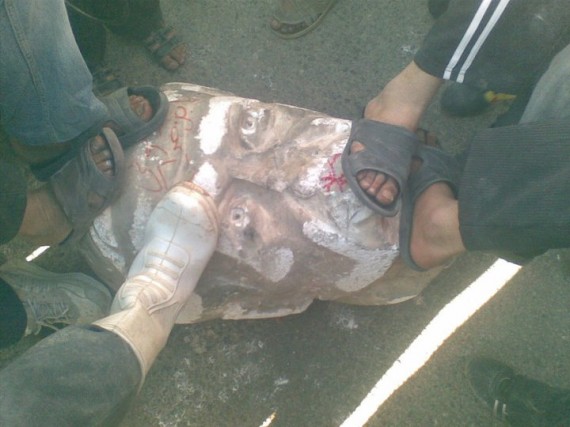A Necessary Evil?

It would seem that after months of peaceful protests followed by brute attacks on civilians by the Syrian military, international pressure would be mounting against the Assad regime. But as the casualties grow, international pressure rarely yields more than a strong urge for Al-Assad to pursue reform. Most of the international community wants him gone, but little action is being taken. Some claim that lack of support for the rebellion is caused by the divide among Syrians. Even with cities such as Homs, Hama, Latakia, and Daraa consistently protesting, demonstrations seldom make it past the city limits of Damascus.
The same lack of unity in Libya meant that NATO support was an absolute necessity for a rebellion victory. However, there are quite a few differences between Syria and Libya from the perspective of the United States, which manifest themselves as American apathy. First of all, Syria directly borders both Iraq and Israel. Despite the brutality towards his own people and increasing verbal attacks towards the United States and Israel, Bashar Al-Assad has done a fairly good job in preventing his own people from attacking Iraq and Israel. If he were to disappear, the United States would be unsure of the consequences that may occur for Israel and Iraq.
Secondly, there is no clear leader of Syria in a Post-Bashar world. Despite the Syrian demographic being fairly moderate compared to the rest of the Arab world, Syria could have radicals take control. Compared to Libya, the threat of this happening would have more dire consequences in Syria, hindering continued American efforts in Iraq and further dissolving the possibility of an Israeli-Palestinian peace solution. The Assad regime has been mostly successful in keeping its borders between Israel and Iraq free of insurgents rushing into its neighbors. Any change in the regime could cause such protection to deteriorate; this has already been a threat that Assad used earlier this summer when he let Syrians storm the Israeli border for the first time in decades.
The third difference is Iran. Iran and Syria are important allies, and the idea of having to deal with Syria also means having to deal with Iran. With the United States being stretched in Afghanistan, Iraq, and Libya, the idea of adding military action in not just Syria, but Iran as well, is unpalatable. Lastly, the United States is unsure about how successful the rebellion will be, meaning that it is keeping Assad close for hopes of future negotiations.
Syria is an economic strongpoint for many European countries and Russia. Russia had approximately $19.4 billion in investments in Syria in 2009 alone. Furthermore, Russia has arms deals with Syria from the Cold War era with billions of dollars’ worth of debt still outstanding. Russia has a clear incentive to keep Assad in power, which is the same reason why Russia was so adamantly opposed to NATO action in Libya. Without Assad in power, Russia stands to lose billions of dollars in arms exports. Furthermore, Russia also needs Syria to maintain influence in the region. Russia has a naval base off the coast of Latakia, Syria’s main port town, and without the Assad regime, Russia could stand to lose significant influence in the region as well as potential opportunities for oil and gas lines.

Europe also has plenty to lose from an Assad downfall. Although Germany, France, and the United Kingdom have all said that it is time for Assad to step down, there is little push to actually cause that regime change. This is because Europe has substantial oil and gas business in Syria—90 percent of Syrian oil exports are to Europe. Even though the European Union has finally agreed to new sanctions against Syria, they are filled with plenty of loopholes to protect European companies. European businesses have until mid-November to put these sanctions in place. While this may not seem to be a loophole at first, this simply means that Syria has 3 months to find a new buyer such as China for this high-demand commodity. In addition, the new sanctions only apply to new contracts, meaning that any existing business in Syria is free to remain there and finish their terms of agreements. This loophole may be large enough to impact the vast majority of business in Syria and would therefore deem the sanctions worthless in ousting Bashar. Especially now, when Europe is experiencing an unprecedented economic crisis, European companies need stability, and its stability is party dependent on oil and gas imports from Syria. These oil and gas imports are directly dependent, at least in the near future, on a Syria with Assad.
As it turns out, the latest unstable dictator of the Middle East is necessary for the stability of the developed world. Although no one can say exactly what a post-Bashar Syria would look like, that fact alone is reason for inaction. While most people would agree that a Syria without the Assad regime would be a victory for the Syrian people and for human rights activists, it’s hard to say what it would mean for the rest of the world. Sadly, the United States needs Bashar for political stability in the region, Europe needs him to keep economic stability, and Russia depends on his friendliness to maintain influence in the Middle East. He may just be the necessary evil for everyone except his own people